How to stop highpotencyguard.com from displaying notifications
Notification SpamAlso Known As: Ads by highpotencyguard.com
Get free scan and check if your device is infected.
Remove it nowTo use full-featured product, you have to purchase a license for Combo Cleaner. Seven days free trial available. Combo Cleaner is owned and operated by RCS LT, the parent company of PCRisk.com.
What kind of page is highpotencyguard[.]com?
While examining highpotencyguard[.]com, we discovered that the purpose of this page is to trick visitors into believing that their computers are infected. Also, highpotencyguard[.]com aims to receive permission to send notifications. It is important to note that users often land on sites like highpotencyguard[.]com unintentionally.
![highpotencyguard[.]com ads](/images/stories/screenshots202309/highpotencyguard-com-ads-main.jpg)
Highpotencyguard[.]com in detail
The message displayed on this deceptive page is designed to create a sense of urgency and alarm for the user. It falsely claims that the user's PC is infected with five viruses and asserts that immediate action is required. Additionally, the message misleadingly states that the user's McAfee subscription has expired, urging them to renew it promptly to maintain PC protection.
The intention here is to create fear and pressure the user into taking immediate action. This type of deceptive website appears to be utilized by affiliates with the goal of earning illegitimate commissions through the sale or renewal of legitimate software.
They exploit users' concerns about computer security to persuade them to purchase or renew subscriptions. Users should exercise caution when encountering such messages and verify the legitimacy of any claims before taking action or making payments online.
Additionally, highpotencyguard[.]com requests permission to show notifications, adding another layer to its deceptive tactics. Once granted, this permission enables the page to deliver a barrage of intrusive pop-up notifications, often promoting various dubious offers, fake security alerts, and potentially harmful advertisements.
These notifications can redirect users to a multitude of questionable destinations, including fake software download pages, gambling sites, adult content, or even more deceptive pages aiming to exploit users' fears further and solicit unnecessary purchases.
| Name | Ads by highpotencyguard.com |
| Threat Type | Push notifications ads, Unwanted ads, Pop-up ads |
| Detection Names | Criminal IP (Phishing), Full List Of Detections (VirusTotal) |
| Serving IP Address | 54.243.179.61 |
| Symptoms | Seeing advertisements not originating from the sites you are browsing. Intrusive pop-up ads. Decreased Internet browsing speed. |
| Distribution Methods | Deceptive pop-up ads, false claims within visited websites, unwanted applications (adware) |
| Damage | Decreased computer performance, browser tracking - privacy issues, possible additional malware infections. |
| Malware Removal (Windows) |
To eliminate possible malware infections, scan your computer with legitimate antivirus software. Our security researchers recommend using Combo Cleaner. Download Combo CleanerTo use full-featured product, you have to purchase a license for Combo Cleaner. 7 days free trial available. Combo Cleaner is owned and operated by RCS LT, the parent company of PCRisk.com. |
Conclusion
Deceptive webpages like the one described often utilize fear tactics and misleading information to manipulate users into taking actions that benefit the perpetrators. These tactics commonly involve false claims of computer infections, expired subscriptions, or security breaches.
Such pages aim to pressure users into making hasty decisions, including downloading questionable software, renewing subscriptions unnecessarily, or providing personal and financial information. Additionally, many deceptive web pages may request permission to show notifications.
Granting this permission can lead to an inundation of intrusive pop-up notifications that redirect users to various suspicious destinations, potentially exposing them to harmful content or scams.
Examples of similar sites are alltimebestdefender[.]com, lifepcessentials[.]com, and totalsystematicpcanalytic[.]info.
How did highpotencyguard[.]com gain permission to deliver spam notifications?
When a website shows notifications, it means the page was visited and given permission to do so. This permission is granted by clicking "Allow" in a browser's pop-up box while visiting the page. Web pages cannot send notifications unless visitors give permission.
How to prevent deceptive sites from delivering spam notifications?
To prevent website notifications, users can choose "Block" or "Block Notifications" options when prompted or close suspicious sites asking for notification permission. It is highly recommended not to click "Allow" on untrustworthy websites, especially when they falsely claim it is necessary to do so for specific actions like verifying you are not a robot.
If you are receiving unwanted notifications, we recommend running a scan with Combo Cleaner Antivirus for Windows to automatically eliminate them.
Appearance of highpotencyguard[.]com website (GIF):
![highpotencyguard[.]com website appearance (GIF)](/images/stories/screenshots202309/highpotencyguard-com-ads-appearance.gif)
Video showing how to eliminate ads delivered by highpotencyguard[.]com using Combo Cleaner:
Instant automatic malware removal:
Manual threat removal might be a lengthy and complicated process that requires advanced IT skills. Combo Cleaner is a professional automatic malware removal tool that is recommended to get rid of malware. Download it by clicking the button below:
DOWNLOAD Combo CleanerBy downloading any software listed on this website you agree to our Privacy Policy and Terms of Use. To use full-featured product, you have to purchase a license for Combo Cleaner. 7 days free trial available. Combo Cleaner is owned and operated by RCS LT, the parent company of PCRisk.com.
Quick menu:
- What is Ads by highpotencyguard.com?
- STEP 1. Remove spam notifications from Google Chrome
- STEP 2. Remove spam notifications from Google Chrome (Android)
- STEP 3. Remove spam notifications from Mozilla Firefox
- STEP 4. Remove spam notifications from Microsoft Edge
- STEP 5. Remove spam notifications from Safari (macOS)
Disable unwanted browser notifications:
Video showing how to disable web browser notifications:
 Remove spam notifications from Google Chrome:
Remove spam notifications from Google Chrome:
Click the Menu button (three dots) on the right upper corner of the screen and select "Settings". In the opened window select "Privacy and security", then click on "Site Settings" and choose "Notifications".
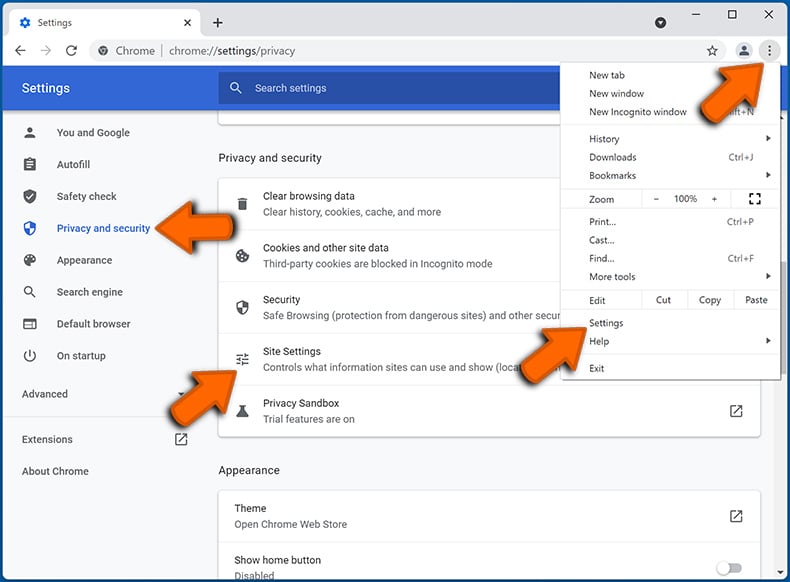
In the "Allowed to send notifications" list search for websites that you want to stop receiving notifications from. Click on the three dots icon near the website URL and click "Block" or "Remove" (if you click "Remove" and visit the malicious site once more, it will ask to enable notifications again).
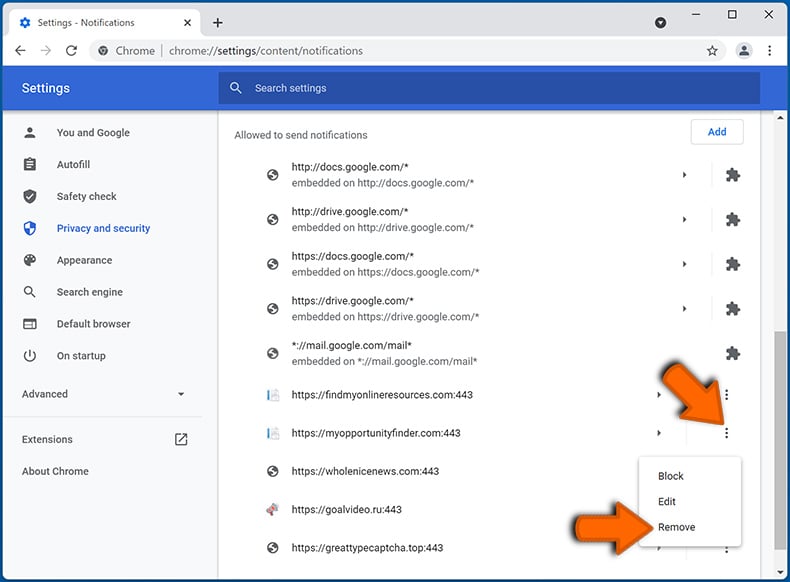
 Remove spam notifications from Google Chrome (Android):
Remove spam notifications from Google Chrome (Android):
Tap the Menu button (three dots) on the right upper corner of the screen and select "Settings". Scroll down, tap on "Site settings" and then "Notifications".
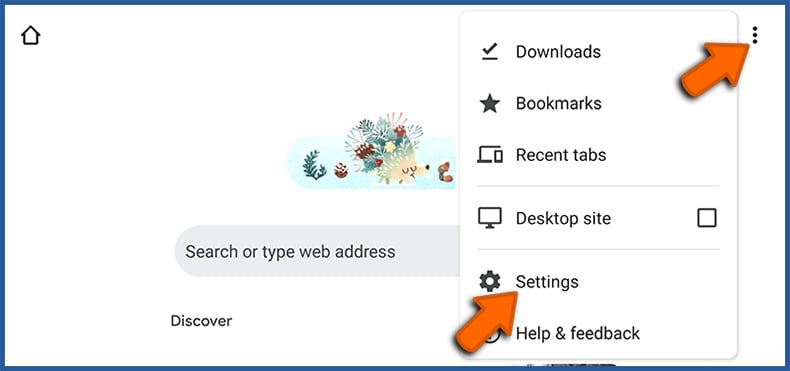
In the opened window, locate all suspicious URLs and tap on them one-by-one. Once the pop-up shows up, select either "Block" or "Remove" (if you tap "Remove" and visit the malicious site once more, it will ask to enable notifications again).
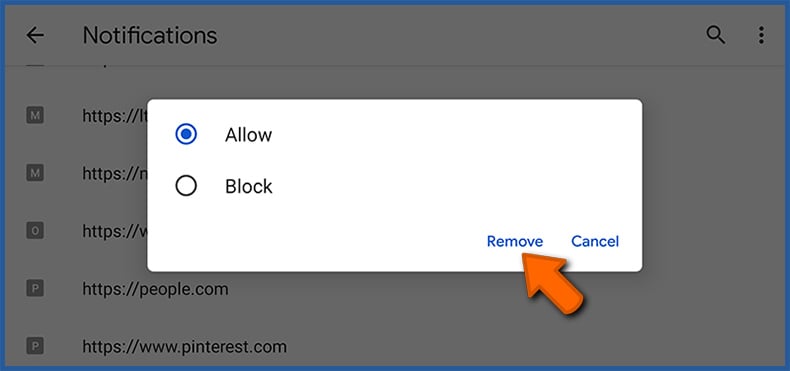
 Remove spam notifications from Mozilla Firefox:
Remove spam notifications from Mozilla Firefox:
Click the Menu button (three bars) on the right upper corner of the screen. Select "Settings" and click on "Privacy & Security" in the toolbar on the left hand side of the screen. Scroll down to the "Permissions" section and click the "Settings" button next to "Notifications".
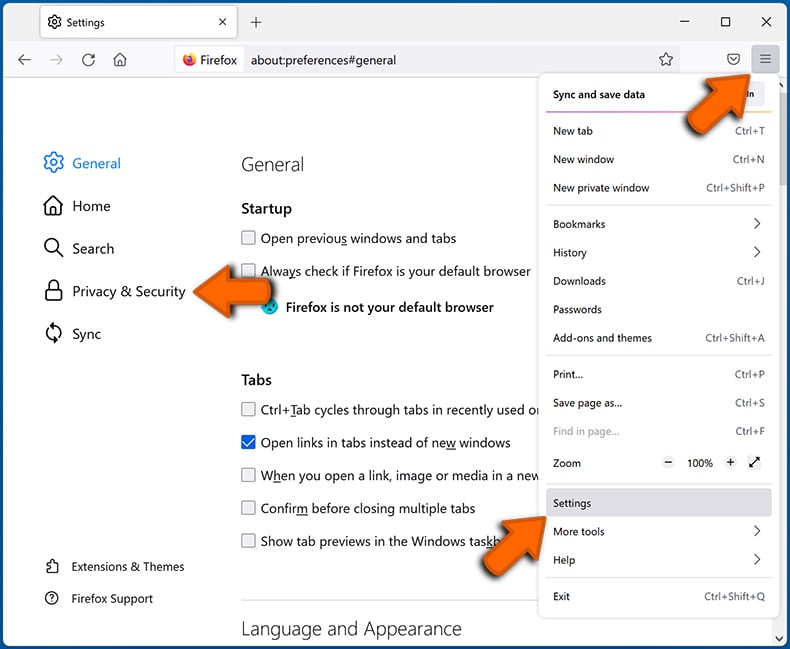
In the opened window, locate all suspicious URLs and block them using the drop-down menu or either remove them by clicking "Remove Website" at the bottom of the window (if you click "Remove Website" and visit the malicious site once more, it will ask to enable notifications again).
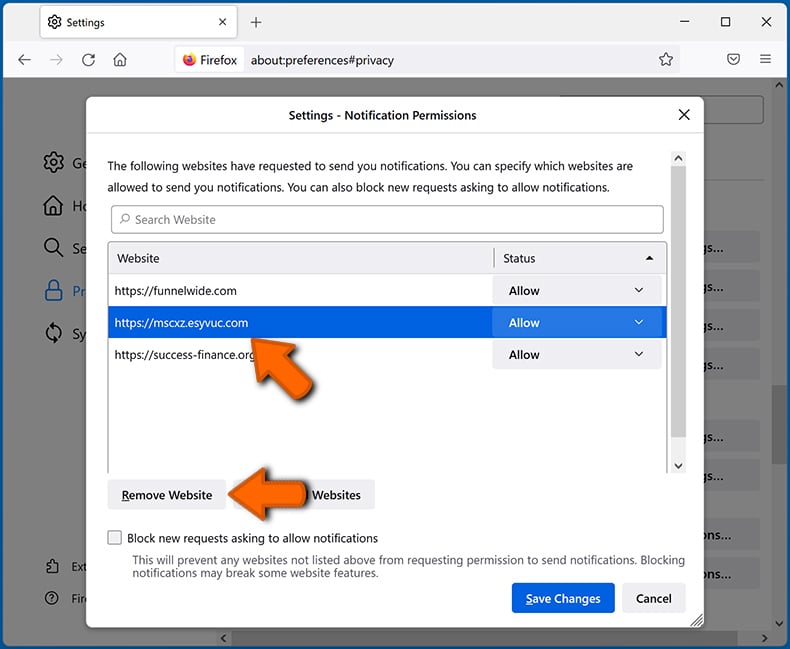
 Remove spam notifications from Microsoft Edge:
Remove spam notifications from Microsoft Edge:
Click the menu button (three dots) on the right upper corner of the Edge window and select "Settings". Click on "Cookies and site permissions" in the toolbar on the left hand side of the screen and select "Notifications".
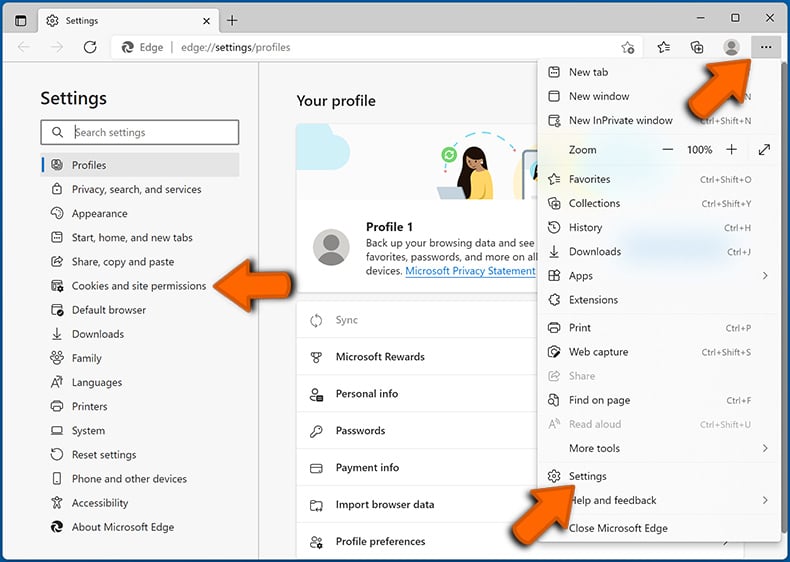
Click three dots on the right hand side of each suspicious URL under "Allow" section and click "Block" or "Remove" (if you click "Remove" and visit the malicious site once more, it will ask to enable notifications again).
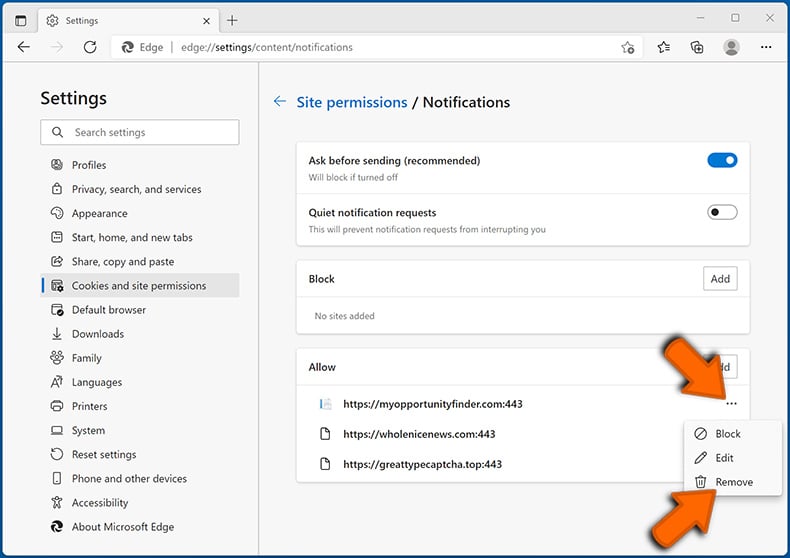
 Remove spam notifications from Safari (macOS):
Remove spam notifications from Safari (macOS):
Click "Safari" button on the left upper corner of the screen and select "Preferences...". Select the "Websites" tab and then select "Notifications" section on the left pane.
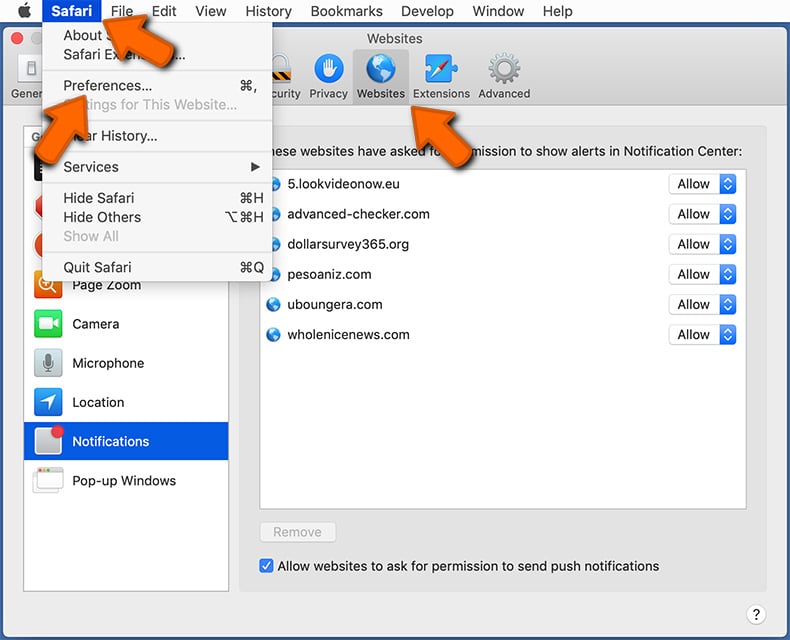
Check for suspicious URLs and apply the "Deny" option using the drop-down menu or either remove them by clicking "Remove" at the bottom of the window (if you click "Remove" and visit the malicious site once more, it will ask to enable notifications again)
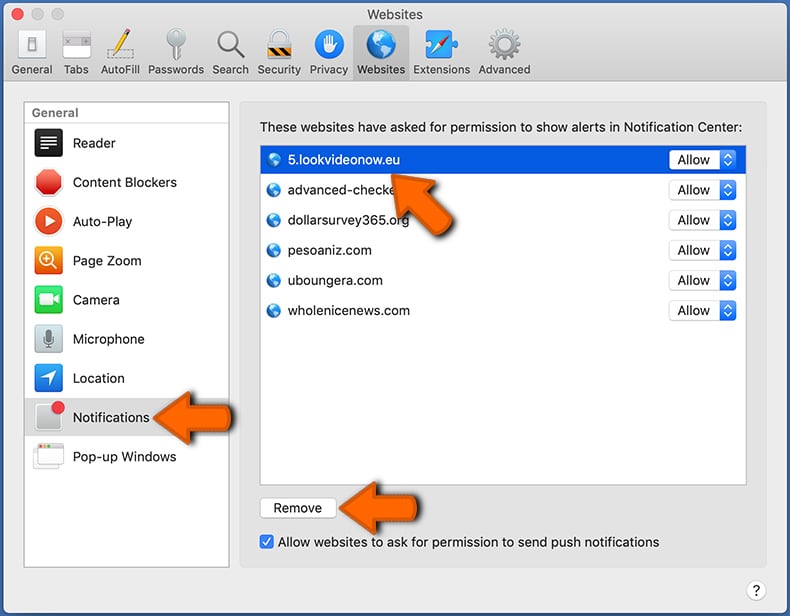
How to avoid browser notification spam?
Internet users should be very skeptical when being asked to allow notifications. While this is a useful feature that allows you to receive timely news from websites you like, deceptive marketers frequently abuse it.
Only allow notifications from websites that you fully trust. For added security - use an anti-malware application with a real-time web browsing monitor to block shady websites that tries to trick you into allowing spam notifications. We recommend using Combo Cleaner Antivirus for Windows.
Frequently Asked Questions (FAQ)
Why am I seeing ads (browser notifications) delivered by highpotencyguard[.]com in the right lower corner of my desktop?
To receive browser notifications from a website, you must permit it. This suggests that you have probably visited highpotencyguard[.]com and granted it this permission.
I have clicked on notification ads, is my computer infected?
Clicking a notification itself is not harmful. However, the websites these notifications lead to could potentially be malicious.
Is highpotencyguard[.]com a virus?
Websites such as highpotencyguard[.]com are not classified as viruses. As a rule, they serve as instruments to promote various scams, questionable software, and (or) potentially malicious pages.
Will Combo Cleaner remove highpotencyguard[.]com ads automatically or manual steps are still required?
Combo Cleaner will scan your computer, revoke all permissions granted to highpotencyguard[.]com, and block any future access to this malicious website. You will not need to take any further action.
Share:

Tomas Meskauskas
Expert security researcher, professional malware analyst
I am passionate about computer security and technology. I have an experience of over 10 years working in various companies related to computer technical issue solving and Internet security. I have been working as an author and editor for pcrisk.com since 2010. Follow me on Twitter and LinkedIn to stay informed about the latest online security threats.
PCrisk security portal is brought by a company RCS LT.
Joined forces of security researchers help educate computer users about the latest online security threats. More information about the company RCS LT.
Our malware removal guides are free. However, if you want to support us you can send us a donation.
DonatePCrisk security portal is brought by a company RCS LT.
Joined forces of security researchers help educate computer users about the latest online security threats. More information about the company RCS LT.
Our malware removal guides are free. However, if you want to support us you can send us a donation.
Donate
▼ Show Discussion